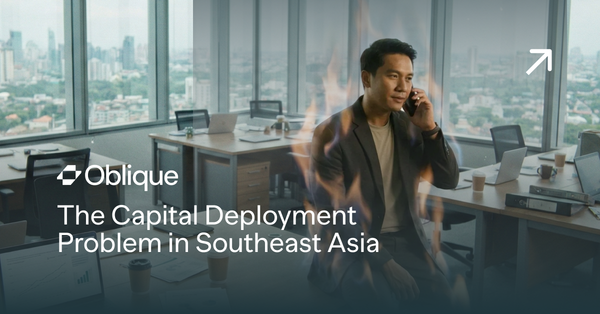Capital, Compliance, Consolidation: The New SEA Tech Trifecta
Superapps raise war chests. Regulators move fast. And founders pivot to survive. Here’s what actually mattered from July 7–14 across SEA’s tech scene.

📈 This Week's Power Moves
Grab Doubles Down on Regional Supremacy with $1.5B War Chest
Grab's $1.5 billion convertible notes offering in June 2025 marks a bold expansion strategy targeting regional fintech dominance 1. The notes, priced at a 40% premium to stock price, signal confident investors betting on Grab's ability to outmaneuver rivals like GoTo through strategic acquisitions. This massive capital raise positions Grab to capitalize on the cooling acquisition talks with GoTo, potentially pursuing alternative M&A targets or expanding its superapp ecosystem across untapped SEA markets.
Why it matters: This isn't just about funding—it's Grab positioning itself as the regional consolidator while competitors struggle with profitability pressures. The premium pricing suggests institutional confidence in Grab's path to dominating Southeast Asia's digital economy.
Bolttech Leads SEA's Modest Funding Recovery
Singapore-based insurtech Bolttech secured $147 million in June 2025, representing the largest deal in a quarter that saw only $285 million raised across 10 rounds—a 37% drop from 2024 2 3. The funding landscape shows clear bifurcation: late-stage companies like Bolttech, Syfe ($53 million), and Salmon ($28 million) attracted significant capital, while early-stage funding collapsed.
Why it matters: The funding concentration in later-stage companies reflects the new reality—investors are backing proven businesses with clear paths to profitability rather than betting on unproven concepts. This trend will likely accelerate consolidation as well-funded players acquire struggling startups.
Summit's Strategic Pivot Triggers Major Layoffs
Singapore fintech Summit (formerly Spenmo) laid off 24 of its 64 employees across Singapore, Indonesia, and India in June 2025 4. The cuts followed a strategic rebrand and pivot from bill payments to accounts payable automation, highlighting the sector's ongoing rationalization as companies struggle to find product-market fit in a tightening funding environment.
Why it matters: Summit's struggles represent broader fintech consolidation pressures. Companies that survived the initial funding winter are now facing the harder challenge of proving sustainable business models, triggering strategic pivots and workforce reductions.
🌏 Region-Wide Ripples
Singapore Captures 88% of SEA Fintech Funding
Singapore's fintech sector dominated H1 2025 funding, capturing $683 million of the total $776 million raised across Southeast Asia 5 6. This represents a 31% increase from H2 2024, driven primarily by late-stage funding surging 113% to $558 million. The concentration reflects Singapore's regulatory stability and cross-border funding access advantages.
Why it matters: Singapore's outsized share indicates increasing capital flight to quality, with investors preferring the city-state's mature ecosystem over regional alternatives. This trend could accelerate the hub-and-spoke model where Singapore serves as the regional headquarters while operations scale across SEA.
Indonesia's E-Commerce Tax Enforcement Reshapes Digital Commerce
Indonesia will implement a 0.5% income tax withholding requirement for e-commerce platforms starting July 2025, affecting sellers earning between $30,000-$300,000 annually 7. Major platforms including Shopee, Tokopedia, TikTok Shop, and Lazada must collect and remit taxes, potentially impacting millions of online merchants as the government seeks to level the playing field with brick-and-mortar retailers.
Why it matters: This policy shift signals broader regional moves toward digital taxation, potentially creating compliance costs that favor larger, well-resourced platforms over smaller competitors. The timing coincides with Indonesia's e-commerce GMV reaching $65 billion in 2024, making tax collection a significant revenue opportunity.
Malaysia's Selangor Launches Dual-Track Accelerator Program
Selangor's government launched the 2025 Twin Accelerator Program in July, targeting deep tech and retail sectors through partnerships with TikTok Shop, Xendit, and DHL 8. The Deep-X program focuses on AI-driven startups across agritech, biotech, and sustainability, while Retail-X supports B2C SMEs with AI-powered marketing solutions.
Why it matters: This represents Malaysia's systematic approach to startup ecosystem development, moving beyond general accelerators to sector-specific programs. The government-private sector alignment suggests Malaysia is positioning itself as a regional innovation hub, potentially competing with Singapore's dominance.
⚡ Undercurrents
Vietnam's Web3 Emergence Defies Global Crypto Skepticism
Vietnam has emerged as a surprising Web3 powerhouse, ranking 3rd globally in cryptocurrency adoption and 7th in crypto ownership 9 10. The Vietri Web3 platform is driving blockchain integration across finance, healthcare, and supply chain solutions, with Vietnam's 400,000 Web3 developers representing one of Southeast Asia's largest blockchain communities.
Why it matters: While many markets remain cautious about crypto, Vietnam's pragmatic embrace of Web3 technologies suggests a contrarian bet on decentralized finance. This positioning could attract global Web3 projects seeking regulatory-friendly environments and skilled development talent.
GCash Challenges Maya's Business Payments Dominance
GCash announced plans to launch its own point-of-sale system in March 2025, directly challenging Maya's established foothold in business payments 11. The move targets underserved businesses outside Metro Manila, leveraging GCash's consumer e-wallet strength and $5 billion valuation to expand into B2B services.
Why it matters: This represents a significant strategic shift as GCash moves beyond consumer payments to compete directly with Maya's core business revenue streams. The battle for business payments could reshape the Philippine fintech landscape, with implications for merchant adoption and payment infrastructure development.
Southeast Asia's Contrarian Anti-Tariff Advantage
Goldman Sachs analysis reveals Southeast Asian markets are uniquely positioned to benefit from potential U.S. tariff increases, with domestic sectors like utilities, telecoms, and real estate operating outside tariff exposure 12. This structural insulation contrasts sharply with North Asian tech-heavy economies facing direct trade risks.
Why it matters: As global trade tensions intensify, Southeast Asia's focus on domestic consumption and services creates a natural hedge against protectionist policies. This positioning could attract capital flows seeking geopolitically neutral investment opportunities.
🗓️ Signals from the Ecosystem
AI Regulation Framework Takes Shape Across ASEAN
Indonesia, Thailand, and Vietnam announced plans to release local AI regulations in 2025, with Indonesia targeting Q2 release 13 14. The regulatory push follows the ASEAN AI Guide released in 2024, as governments balance innovation promotion with data privacy and consumer protection concerns.
Why it matters: Coordinated AI regulation across ASEAN could create a unified framework for AI development, potentially giving the region competitive advantages over markets with fragmented or restrictive regulatory approaches. This standardization could accelerate AI adoption across borders.
Venture Capital Fundraising Hits Six-Year Low
Southeast Asia VC fundraising fell 54% between 2021-2024, from $4.8 billion to $2.2 billion15. Despite this decline, the region's political stability and neutral geopolitical stance are attracting investors seeking resilient opportunities amid global uncertainty.
Why it matters: The funding winter is forcing ecosystem maturation, with investors shifting toward performance-based capital allocation and longer-term relationship building. This selectivity could ultimately strengthen the ecosystem by supporting higher-quality startups.
Digital Nomad Visa Programs Expand Across SEA
Thailand, Malaysia, and Indonesia have launched digital nomad visa programs to attract skilled foreign talent and high-net-worth individuals 16. These initiatives target the global pool of displaced tech workers from major layoffs, particularly those seeking to return to or explore Southeast Asian markets.
Why it matters: The talent attraction race reflects recognition that skilled workers are increasingly mobile and influential in startup ecosystem development. Countries offering visa flexibility could gain competitive advantages in attracting entrepreneurial talent and fostering innovation.
The regional tech ecosystem appears to be entering a phase of strategic consolidation and selective growth, with clear winners emerging in the funding landscape while new regulatory frameworks and market opportunities reshape competitive dynamics across Southeast Asia.





